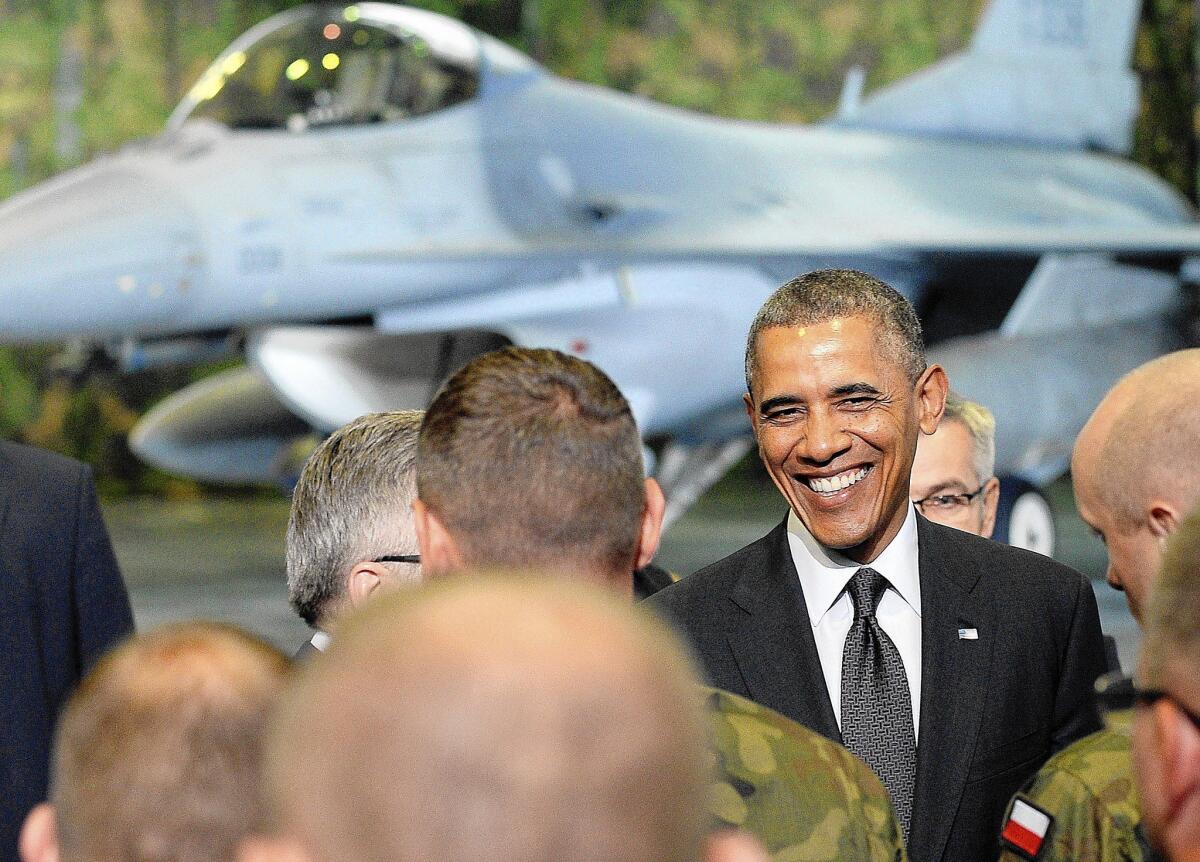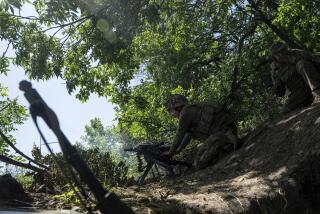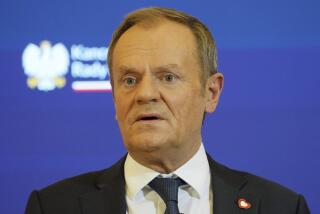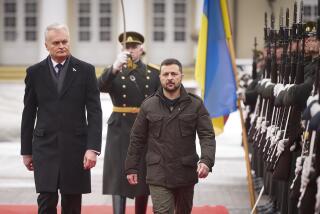Obama offers military aid to Eastern European allies

As fresh fighting erupted in eastern Ukraine, President Obama sought Tuesday to reassure allies in Eastern Europe with a new offer of military aid to bolster security and counter what he called “provocative actions” by Russia.
Obama promised to ask Congress for money to beef up the U.S. air, land and sea presence, and to increase military exercises and training in the region. The president said he wants U.S. naval forces to increase deployments to the Black and Baltic seas and to deepen NATO partnerships with countries in the region, including Georgia, Moldova and Ukraine.
Obama, who arrived in Poland for the first stop of a four-day trip to Europe, aimed to allay anxiety that has grown among Russia’s neighbors since Moscow this year seized the Crimean peninsula from Ukraine.
European security is the “cornerstone of our own security and it is sacrosanct.... It is a commitment that is particularly important at this point in time,” Obama said, standing in front of four U.S. F-16 fighter jets.
Meanwhile, Ukrainian authorities claimed significant progress in their off-and-on fight against pro-Russia separatists in the east of the country, but the militants said the claims were exaggerated.
Parliament speaker Oleksandr Turchynov said Ukrainian army and security forces stormed a secret “terrorist” camp in the Donetsk region, killing scores of people, and officials also claimed to have inflicted major damage on separatists near the city of Slovyansk.
“Today in the morning, many terrorists were destroyed in the camp they had secretly set up in the industrial zone near the town of Severodonetsk” in Donetsk, Turchynov told a session of parliament. “Now our anti-terrorist operation forces are conducting … active measures aimed at liberating Severodonetsk.”
There were widely conflicting reports about heavy fighting near Slovyansk, a city in the Donetsk region that has been the epicenter of the pro-Russia rebellion. Some Russian-speaking Ukrainians, assisted by heavily armed Russians who have streamed across the border, are seeking to secede from Ukraine, following the lead of Crimea, which was annexed by Russia in March.
A Ukrainian government official, Vladyslav Selezniov, said Ukrainian forces had killed as many as 300 secessionists on the outskirts of Slovyansk.
The head of the pro-Russia group holding Slovyansk, however, said only two of his men were killed in the fighting, and 12 wounded.
Vyacheslav Ponomaryov also said his separatist forces had shot down a Ukrainian SU-25 combat jet and an MI-24 helicopter and burned six Ukrainian army armored vehicles. Selezniov denied that had occurred.
None of the claims could be independently confirmed.
The fighting was reported to be on the eastern outskirts of Slovyansk, with especially heavy combat near the outlying areas of Semyonovka and Krasny Liman.
Ponomaryov, who calls himself the mayor of Slovyansk, insisted that his forces had held their own.
“Our actions were very successful today, as we repelled three attacks and currently are holding our positions,” he said in a telephone interview from Slovyansk. “We are bracing now for a major storm of the town.”
Russian authorities announced last week that they helped evacuate more than 100 children from Slovyansk to a summer camp in Crimea and offered Ukrainian authorities help delivering humanitarian aid to the conflict-stricken regions of Donetsk and Luhansk. The offer was bluntly rejected; Ukraine’s Foreign Ministry spokesman, Yevgeny Perebeynos, suggested that Russia withdraw its militants from the regions instead.
The Kremlin has denied that it has aided the secessionist movement, but Russian nationals have been identified among the separatists, and they have been heavily armed with military weapons.
Some European officials say Washington has let its commitment to defend allies slide as the Obama administration has focused on competing priorities in the Middle East and Asia.
Obama offered to call on Congress to create a “European reassurance fund” of up $1 billion that would bolster NATO readiness, particularly in its eastern flank. He also reiterated U.S. concerns that North Atlantic Treaty Organization members fall short of their targets for funding their militaries.
Obama’s visit to Poland comes as the former communist nation is celebrating the 25th anniversary of its transition to democracy. The anniversary and the Solidarity movement that spurred the peaceful shift were repeatedly held up by both Polish and U.S. leaders as a model for the fledgling government in Ukraine.
“Poles know better than most how precious freedom is,” Obama said.
He warned of additional economic sanctions and political isolation for Russia if President Vladimir Putin does not respect Ukraine’s sovereignty and new government.
Obama is due to meet Wednesday with Ukraine’s president-elect, Petro Poroshenko. He does not plan to meet formally with Putin, although the two will probably cross paths at a memorial for the 70th anniversary of the D-day landings at Normandy this week.
Obama attended a dinner at the Royal Palace honoring former Solidarity movement leaders, including former Polish President Lech Walesa, who has said the U.S. president has shirked his responsibilities.
Walesa, in an interview with CNN that aired Tuesday, said that the world lacks “politically moral leadership” and that Americans “should finally start acting like a superpower again.”
Hennessey reported from Warsaw and Loiko from Moscow. Special correspondent Victoria Butenko in Kiev, Ukraine, contributed to this report.
More to Read
Start your day right
Sign up for Essential California for news, features and recommendations from the L.A. Times and beyond in your inbox six days a week.
You may occasionally receive promotional content from the Los Angeles Times.







